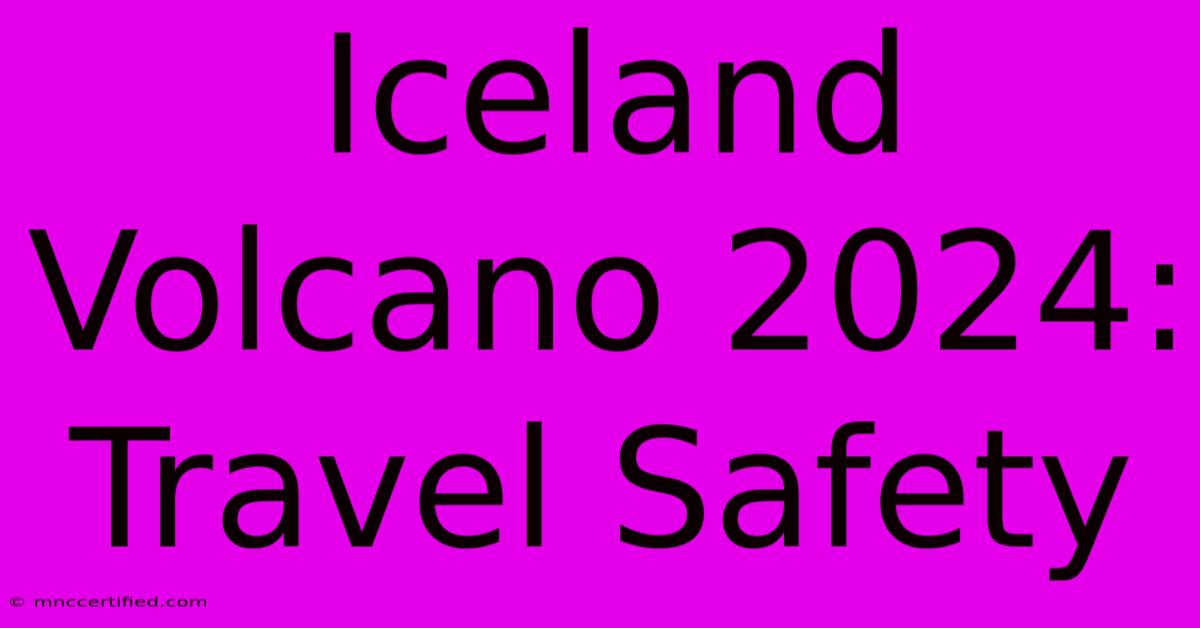Iceland Volcano 2024: Travel Safety

Table of Contents
Iceland Volcano 2024: Travel Safety & What You Need to Know
Iceland's dramatic landscapes, born from volcanic activity, attract millions of tourists annually. While the breathtaking scenery is a major draw, the inherent volcanic activity means understanding potential risks is crucial for safe travel. This comprehensive guide addresses Iceland volcano safety in 2024, providing essential information for planning your trip.
Understanding Iceland's Volcanic Activity
Iceland sits on the Mid-Atlantic Ridge, a boundary between two tectonic plates. This geological setting fuels frequent volcanic eruptions, though not all are explosive or pose immediate danger to tourists. Volcanic activity in Iceland ranges from effusive eruptions (lava flows) to more explosive events (ash plumes and pyroclastic flows). The level of risk varies considerably depending on the volcano and the type of eruption.
Monitoring & Alert Systems
Iceland boasts a sophisticated volcano monitoring system, constantly tracking seismic activity, ground deformation, and gas emissions. The Icelandic Meteorological Office (IMO) provides up-to-date information and issues alert levels, ranging from green (no signs of eruption) to red (imminent or ongoing eruption). Staying informed is paramount; regularly check the IMO website and follow official channels for the most accurate information.
Iceland Volcano 2024: Potential Hazards & Safety Precautions
While predicting the precise timing and location of eruptions is impossible, understanding potential hazards is vital for responsible travel.
Lava Flows
Lava flows, though visually spectacular, can be extremely dangerous. Never approach a lava flow; the intense heat and unpredictable movement pose significant risks. Follow designated viewing areas and heed all official warnings.
Ash Plumes
Explosive eruptions can generate ash plumes that disrupt air travel and affect air quality. Ash inhalation can cause respiratory problems. If an eruption occurs, be prepared for potential flight cancellations and follow official advice on air quality and safety measures. Packing a face mask can be a prudent precaution.
Gas Emissions
Volcanic gases, such as sulfur dioxide, can be harmful. Areas near active volcanoes may experience elevated gas concentrations. Pay attention to any warnings about gas emissions and avoid affected areas. Symptoms of gas exposure can include headaches, breathing difficulties, and irritation of the eyes and throat.
Earthquakes
Volcanic eruptions are often preceded by increased seismic activity. While most earthquakes in Iceland are minor, stronger tremors can cause damage and injuries. Be aware of your surroundings and follow safety guidelines issued by local authorities.
Planning Your Trip Safely: Essential Tips
- Check the IMO website regularly: Stay informed about the current alert levels for all Icelandic volcanoes.
- Book tours with reputable operators: Choose tour operators with experience in volcanic areas and a commitment to safety.
- Follow official advice: Heed all warnings and instructions from local authorities and emergency services.
- Pack appropriately: Include comfortable walking shoes, layers of clothing, a rain jacket, and a face mask.
- Have a contingency plan: Be prepared for potential disruptions to your itinerary due to volcanic activity.
- Travel insurance: Ensure your travel insurance covers volcanic events and related disruptions.
- Learn basic Icelandic phrases: Familiarity with basic safety instructions in Icelandic can be helpful.
- Download offline maps: Ensure access to maps even without internet connectivity.
Beyond the Volcanoes: Exploring Iceland Safely
Iceland offers much more than volcanic landscapes. Remember that even in areas far from active volcanoes, weather conditions can change rapidly. Always check weather forecasts and be prepared for all conditions.
Responsible tourism is crucial. Respect the environment, adhere to marked trails, and leave no trace behind. By planning ahead and following safety guidelines, you can enjoy an unforgettable and safe trip to this stunning island nation. Remember, safety should always be your top priority when exploring Iceland's incredible volcanic wonders.

Thank you for visiting our website wich cover about Iceland Volcano 2024: Travel Safety. We hope the information provided has been useful to you. Feel free to contact us if you have any questions or need further assistance. See you next time and dont miss to bookmark.
Featured Posts
-
Bengals Star Predicts Week 13 Win
Nov 22, 2024
-
Mauras Take Rooney Vardy Dispute
Nov 22, 2024
-
Snowflake Beats Q3 Revenue Signals Turning Point
Nov 22, 2024
-
Colorado Lands Recruit Julian Lewis
Nov 22, 2024
-
Deion Sanders Lands Top Qb Recruit
Nov 22, 2024